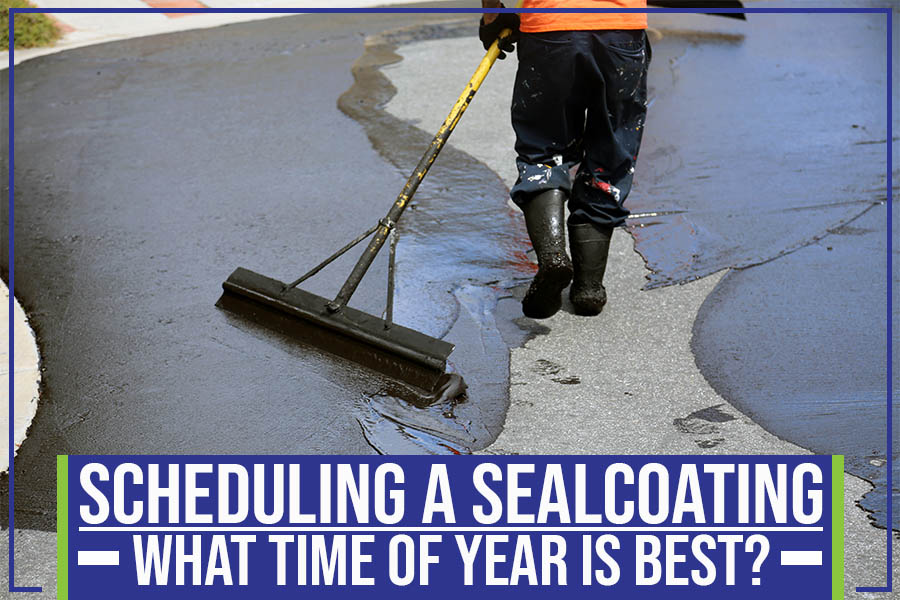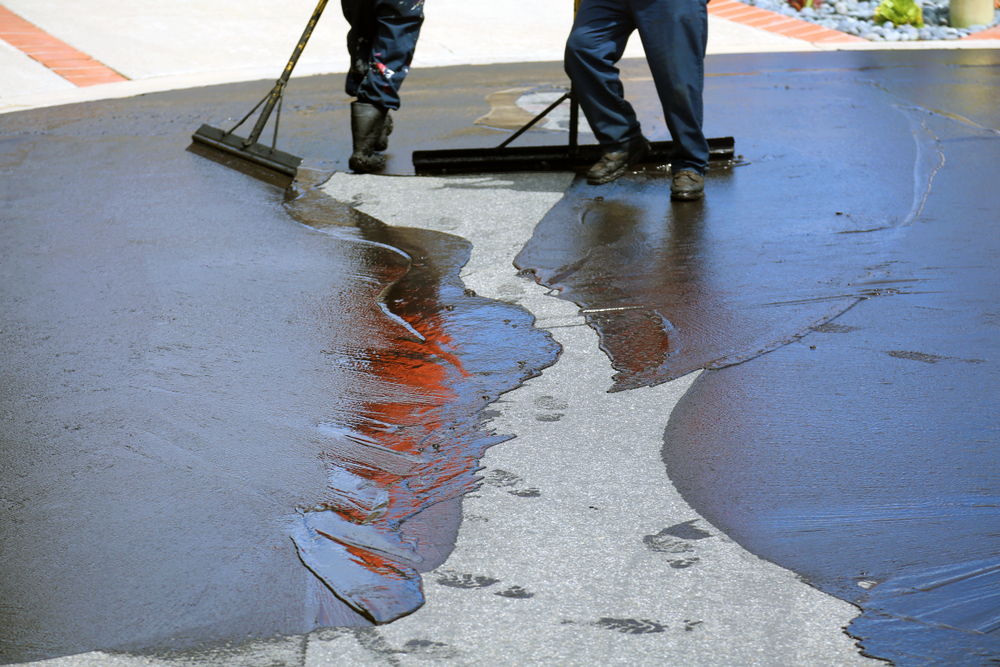
Key Takeaways:
- Sealcoating is performed to protect asphalt pavement from damage caused by weather, water, and UV rays.
- Sealcoating material is applied to the surface of the asphalt in a thin layer. This layer acts as a barrier, preventing water and oxygen from penetrating the asphalt and causing damage.
- In addition to protecting against weather and UV damage, sealcoating also helps to fill in small cracks and defects in the surface of the asphalt.
- Seal coating should be done every 2-3 years, but this depends on climate & traffic conditions where you live.
If you have a paved driveway, patio, or any other outdoor surface that needs protection from the weather, sealcoating is a must. During sealcoating, a coating is applied on asphalt pavement to protect it from the elements and extend its lifespan. But do you know the best time to schedule your seal coat? This blog post discusses everything you need to know about seal coating and how often you need this service!
What is Sealcoating?
Sealcoating is a process used to protect asphalt driveways and parking lots from damage caused by weather, water, and UV rays. Sealcoating material is applied to the surface of the asphalt in a thin layer. This layer acts as a barrier, preventing water and oxygen from penetrating the asphalt and causing damage.
UV rays can also cause damage to asphalt, making it brittle and prone to cracking. Sealcoating material helps reflect the UV rays, keeping the asphalt surface cooler and extending its lifespan.
In addition to protecting against weather and UV damage, sealcoating also helps to fill in small cracks and defects in the surface of the asphalt. This provides a smoother surface for vehicles and helps prevent further damage. sealcoating is an essential part of maintaining an asphalt driveway or parking lot.
Related: All About Sealcoating a Driveway
What Are the Benefits of Sealcoating?
Protects Against the Elements
One of the primary benefits of sealcoating is protecting your asphalt pavement against the elements. Sealcoating creates a barrier between your pavement and the sun, rain, snow, and ice. This barrier helps prevent damage from these elements, including cracking, potholes, and erosion.
Increases Pavement Lifespan
Another benefit of sealcoating is that it can help increase your asphalt pavement’s lifespan. Sealcoating can help prevent or delay common forms of asphalt damage. This protection can extend the life of your pavement by several years.
Enhances Pavement Appearance
In addition to protecting your pavement, sealcoating also enhances its appearance. Sealcoating gives asphalt a dark, glossy finish that makes it look new. This improved appearance can help increase curb appeal and property value.
Reduces Maintenance Costs
Sealcoating can also help to reduce the costs of maintaining your asphalt pavement. It can help prevent costly repairs by protecting your pavement from damage. It makes cleaning the pavement easier, saving you money on power washing or other cleaning services.
Can Be Done Quickly and Easily
Another benefit of sealcoating is that it is relatively quick and easy. It can typically be completed in just a few hours and does not require special equipment or training. This makes it an ideal solution for busy property owners who want to protect their investments without taking on a significant project.
Related: Essentials for Your Fall Asphalt Maintenance Checklist
How Often Should a Driveway Be Seal Coated?
How often should you seal coat your driveway? It depends on several factors, including the climate and the traffic the driveway receives. Generally, it’s a good idea to seal coat your driveway every two to three years.
However, you may need to do it more often if you live in an area with harsh winters or hot summers. Likewise, if your driveway sees much traffic, you may need to seal the pavement more frequently. Following these guidelines can help ensure that your driveway looks its best for years to come.

What Is the Best Time of Year to Seal the Coat?
The best time to seal the coat is typically in the late spring or early summer when the weather is warm and dry. This gives the sealant time to cure properly before any rain or snowfall. Applying a sealant during colder months can result in the adhesive not adhering correctly to the surface, defeating the purpose of sealing in the first place. Generally, it is best to avoid applying a sealant during extreme heat or cold periods.
How Do I Know If My Driveway Needs Seal Coated?
There are a few telltale signs that it’s time to have your driveway seal coated. One is the appearance of cracks on the surface of the asphalt. These can be caused by everything from extreme weather conditions to tree roots growing underneath the asphalt pavement. If left unrepaired, these cracks will only get bigger and allow water to seep in, which can lead to further damage.
Another sign that your driveway may need seal coated is if the surface has become dull or faded. This is usually due to UV exposure and can make the asphalt more susceptible to cracking and other forms of damage.
If you notice any of these signs, it’s a good idea to have your driveway evaluated by a professional. They will be able to determine if seal coating is necessary and, if so, how often it should be done to keep your driveway in good condition. By taking these steps, you can help ensure that your asphalt driveway will last for years.
Preparing Your Driveway for Sealcoating
1. Clean the Driveway
The first step in preparing your driveway for sealcoating is to clean it. You will need to remove all dirt, debris, and stains from the driveway’s surface. This can be done with a power washer, a garden hose, and a stiff brush.
2. Repair Any Cracks or Damage
The next step is to repair any cracks or damage that may be present on the driveway. Small gaps can be filled with an asphalt crack filler, while larger cracks may require an asphalt patch. If there are any holes or potholes in the driveway, they should also be filled with an asphalt patch.
3. Prime the Driveway
Once the cracks and holes have been filled, you must prime the driveway. This step helps ensure the seal coat adheres appropriately to the driveway’s surface. You can use a brush or roller to apply a thin layer of primer to the entire surface of the driveway.
4. Sealcoat the Driveway
After the primer has had time to dry, you can seal coat the driveway. Sealcoating applies a thin layer of asphalt over the driveway’s surface. This will help protect the driveway from weather damage and give it a new look.
309 Paving Services is the company to call for all your asphalt seal coating needs!
We use GemSeal products, some of the best on the market. Not only do they help create a slip-resistant surface, but they also work to increase adhesion and decrease dry time. So, you can relax and know that your parking lot will look its best in no time!
Our experienced professionals know how to get the job done right in Peoria Heights – so you can rest easy knowing that your parking lot is in good hands. Contact us today for a free estimate!


